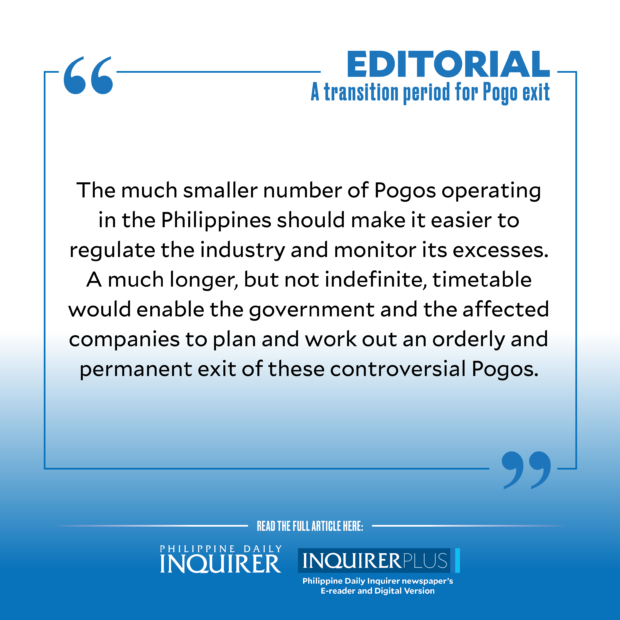By all indications, the end is near for the controversial Philippine offshore gaming operators (Pogos), the virtual casino companies once hailed for their supposed huge injection of funds into the local economy. After many dark incidents, however, these ubiquitous Pogos have been denounced for being a lightning rod for criminality and human trafficking.
After some six months of wrangling and back and forth, Sen. Sherwin Gatchalian finally convinced majority of his colleagues in the Senate committee on ways and means to approve the committee report calling for the expulsion of Pogos within three months. The 120-page report cited the pervasive social ills that outweighed the Pogos’ “overrated, moderate, [and] erratic” economic benefits.
The prospect of a permanent ban on Pogos has drawn cheers from several sectors, including economic managers who noted the steep social costs it has exacted compared to last year’s tax collections of P8.88 billion, far short of the projected P32 billion in annual taxes expected to be gained when the law imposing taxes on Pogos was passed in 2021.
The resulting social ills are indeed worrying. Data from the Philippine National Police show that from Jan. 1, 2017 to June 30, 2023, 103 Pogo-related crimes affecting some 4,355 individuals were reported. These include kidnapping, homicide, theft, robbery-extortion, cryptocurrency fraud, illegal possession of firearms, human trafficking, grave coercion, money laundering, and even prostitution. These social costs are simply “quite high,” said Socioeconomic Planning Secretary Arsenio Balisacan, “We don’t think that the benefits in terms of revenue generated and impact on the economy are worth the cost,” Balisacan said, adding that what economic managers wanted were “legitimate investments … that will produce goods and services.” Finance Secretary Benjamin Diokno stressed his position that the Pogos must go, noting that they pose a “reputational risk” to the Philippines, with crimes like alleged money laundering putting the country under closer scrutiny by global financial watchdogs. “I have no recommendation on phasing out, I just want them to go,’’ Diokno said.
Unfortunately, Gatchalian risks losing the precious signatures needed to bring the committee report to the plenary, where it is expected to move forward. The sticking point and potential deal breaker is the recommended three-month period before the ban on Pogos is imposed. Why not a gradual phaseout to allow the government to earn badly needed revenues from legitimate Pogos that pay the right taxes, suggested Sen. Ronald dela Rosa. “[W]e can give them one to two years’ adjustment period especially those that are legal and have no anomalies. They should be given time to adjust since they have already put [in] capital. Filipino businessmen have already made investments,” he added.
For Senate Deputy Majority Leader Joseph Victor “JV” Ejercito, the Pogo sector should be given at least two years to pursue other lines of business and find alternative employment for their employees. “[A]bruptly ending Pogo in three months” would send a bad signal to foreign investors that rules and policies can just change abruptly change, he pointed out. “Let us also give time for businesses, for employment related to Pogo, to find the alternatives. Dapat paghandaan. Hindi yung bigla basta-basta,” he added.
There is no doubt that the Pogos are inimical to our peace and social order and must go, regardless of the revenue earned from taxes or business for the real estate industry. But even the failure of the Philippine Amusement and Gaming Corp. (Pagcor) to fully collect the taxes is an argument for banning these Pogos, which the Chinese government had officially opposed.
There are legitimate concerns that should make Gatchalian reconsider the short three-month transition period. What the government needs to do before finally shutting down the Pogos is to find alternative employment for Filipinos working in these Pogo hubs. According to the Association of Service Providers and Pogos, whose members include 16 Pogos licensed by the Pagcor and 68 services providers, the abrupt closure of the Pogo industry will mean the loss of over 23,000 jobs held by Filipinos. More than the revenues, this issue is of paramount concern that needs to be addressed.
With the COVID-19 pandemic and the crackdown on the industry here and in China, the number of Pogos (those that are operating legally) has been slashed to only 32 active offshore gaming licenses in the Philippines—from a high of 281 before the devastating public health crisis struck in 2020. The much smaller number of Pogos operating in the Philippines should make it easier to regulate the industry and monitor its excesses. A much longer, but not indefinite, timetable would enable the government and the affected companies to plan and work out an orderly and permanent exit of these controversial Pogos.
